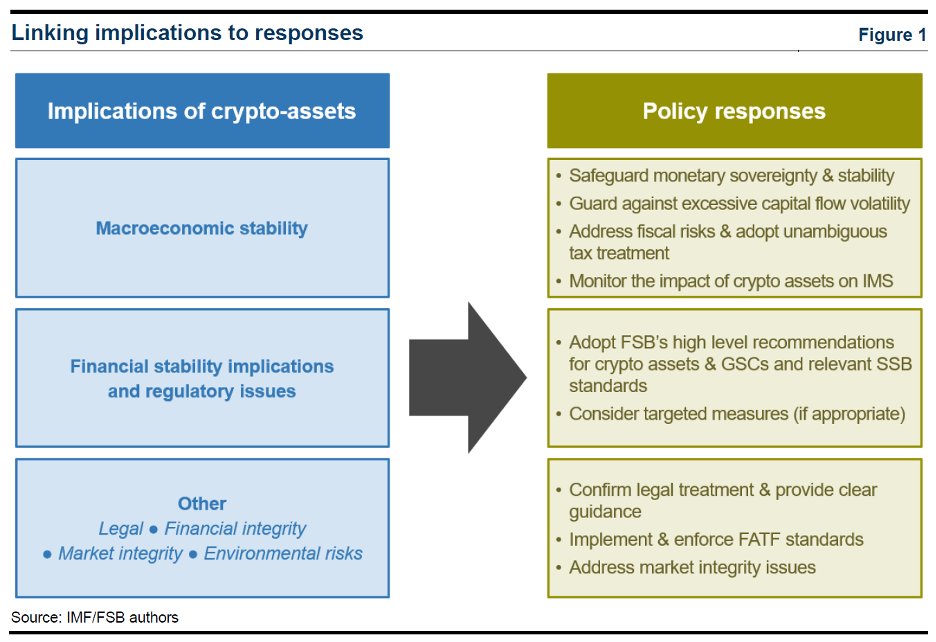
The world’s top financial watchdogs have issued a stern warning to governments: crypto could topple the global economy.
That’s the clear message issued by the International Money Fund (IMF) and the Financial Stability Board (FSB) in a paper released yesterday.
This is a big deal.
The IMF is like the world’s financial therapist. It provides economic advice and financial support to help countries navigate economic challenges, trying to keep global financial stability.
The FSB is like a lookout tower, constantly scanning the horizon for approaching economic storms, as it tries to help prevent global financial meltdowns.
Their opinion matters. Governments listen to them. And now they’ve said crypto could take down the global financial system.
I think they’re right.
But their recommendations are ultimately good news for crypto investors. Here’s why.
Crypto is a Roller Coaster
The paper spends a lot of time talking about the volatility of crypto assets, but we long-term investors already know this. Crypto is a roller coaster.

The more people who buy crypto, they explain, the more of a danger this becomes. Especially in emerging countries, where the financial system may already be shaky, if the majority of your citizens move their money into crypto, your economy is now on the crypto roller coaster.
Things get even worse if you decide to adopt bitcoin as a national currency (as El Salvador has done). It’s hard for businesses to accept payment in a currency that can drop by 50% in a few weeks. (Most citizens don’t like seeing their wealth wiped out overnight, either.)
Most cryptocurrencies are not currencies: you can’t buy most things with bitcoin.
No one wants money that can rapidly depreciate. (Though most people appreciate money that rapidly appreciates.) We’ll wait to see how the El Salvador experiment plays out, but I’m not holding my breath.
As a long-term investment? I’m a bitcoin believer. As money? Not so much.
Bitcoin, they argue, is too unstable to use as money, and I agree. But what about stablecoins?
The Stablecoin Situation
According to the paper, the situation with stablecoins is even more dire. A country that finds itself in a financial pickle could see investors pouring their money into stablecoins, especially as it becomes easier and cheaper to move from fiat to crypto.
This means money would pour out of the country, making it even harder for distressed governments to manage their exchange rate and maintain financial order.
These problems are particularly acute in EMDEs (Emerging Markets and Developing Economies): countries like Brazil and India that are rapidly growing from low-income to high-income industrialized economies. They need money to grow.
These countries also have weaker monetary frameworks and higher inflation rates, which means their currencies are sometimes unable to provide the main functions of money: as a store of value, medium of exchange, and unit of account.
When your economy is growing rapidly, but your currency is still fragile, you’re susceptible to “bank runs” in the form of massive outflows to stablecoins. And because humans move in herds, once a financial panic starts, it can rapidly spread around the world.
Why? Because we live in a global economy.
We’re All Connected
The paper goes to great lengths to explain that risks are “mutually interactive and reinforcing,” meaning what affects one economy potentially affects all economies.
No country operates in a bubble. In a global economy, we’re all connected.

We saw this quite clearly with the collapse of Terra/LUNA, which was followed by the collapse of FTX, followed by the collapse of several U.S. banks: a domino chain that was stopped (we hope) with the bailout of Credit Suisse.
This paper is a wake-up call for world leaders to get on the same page about crypto, and to finally regulate the damn things, once and for all.
And that is good news for investors.
Regulation = Adoption
To summarize their advice in three words: regulation, regulation, regulation.

Their recommendations are common sense: regulate crypto assets like other financial assets. Enforce KYC/AML. Be clear about legal and tax issues. Turn the “grey areas” of crypto into black and white.
I see this as a Very Good Thing.
If governments around the world can agree on sensible regulation for crypto assets (as the European Union is doing), then crypto finally becomes mainstream.
Right now, most banks and most businesses won’t touch it. Most investors still think bitcoin is bogus. But once it fits into the framework, everyone’s opinion will change.
Bitcoin will become boring.
It will be just another financial asset — like stocks and bonds — that you can buy through your broker or your bank. In a couple of decades, no one will understand what all the fuss was about. We’ll have to remind people how controversial it was.
(This assumes, of course, that governments don’t regulate bitcoin out of existence — but if you look at which way the winds are blowing in the EU and Congress, that seems unlikely.)
So while the tone of the IMF/FSB paper is pretty alarmist, if it gets governments to get off their asses and regulate crypto assets, I see that as good news for investors.
As the first major regulations get put in place, I predict, the market will applaud. With regulatory certainty will come a huge price increase. (Which will wear off over time – prices won’t keep climbing forever.)
Bitcoin and Ethereum will be the big beneficiaries of regulation, but I think the entire crypto market will go up, since it all tends to follow the price of bitcoin.
When will all this happen? Barring any unforeseen difficulties, probably in the next couple of years.
You heard it here first.
Investor Takeaway
We’re staying the course.
We’re steady-drip investing a small amount each month into BTC and ETH, as we wait for regulation to arrive. (Read our investing approach here.)
The TLDR is that crypto could topple the global economy … but regulation will prevent it.
That means regulation is coming. And this new paper will help it come even faster.
Get your bags ready.
Over 50,000 investors get this column every Friday. Click to subscribe and join the tribe.
- SEO Powered Content & PR Distribution. Get Amplified Today.
- PlatoData.Network Vertical Generative Ai. Empower Yourself. Access Here.
- PlatoAiStream. Web3 Intelligence. Knowledge Amplified. Access Here.
- PlatoESG. Automotive / EVs, Carbon, CleanTech, Energy, Environment, Solar, Waste Management. Access Here.
- PlatoHealth. Biotech and Clinical Trials Intelligence. Access Here.
- ChartPrime. Elevate your Trading Game with ChartPrime. Access Here.
- BlockOffsets. Modernizing Environmental Offset Ownership. Access Here.
- Source: https://www.bitcoinmarketjournal.com/crypto-could-topple-the-global-economy/



